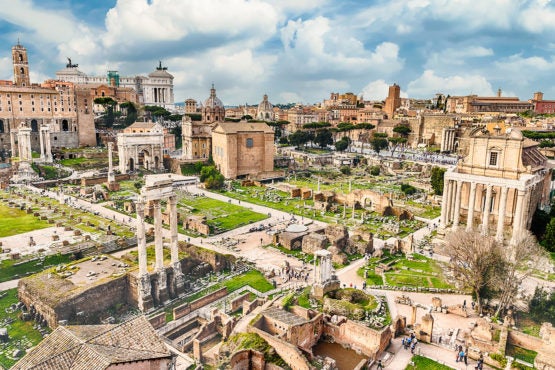Although Absent Since Ancient Rome
The absenteeism of the Roman Empire fueled Western civilization, Stanford scholar says
Zilch like the Roman Empire ever emerged again – which was a good affair, says Stanford historian Walter Scheidel. Here, he explains why.
Why the Roman Empire fell is often discussed in history classes and textbooks. But new research by Stanford historian Walter Scheidel considers an angle that has received little scholarly attending: Why did it – or something similar to it – never emerge again?

Stanford historian Walter Scheidel calls the fall of Rome the "bully escape." (Image credit: Daniel Hinterramskogler)
Scheidel discusses in a new book why the Roman Empire was never rebuilt and how pivotal its absence was for modern economic growth, the Industrial Revolution and worldwide Western expansion. Freed from the clutches of an imperial monopoly, Europeans experimented and competed, innovated and collaborated – all preconditions for the earth nosotros now inhabit, he said.
Scheidel, the Dickason Professor in the Humanities and a Catherine R. Kennedy and Daniel L. Grossman Fellow in Human being Biological science, is author of Escape from Rome: The Failure of Empire and the Road to Prosperity (2019). He besides edited The Scientific discipline of Roman History: Biology, Climate and the Future of the Past (2018).
The collapse of the Roman Empire is considered by many to be ane of the greatest disasters in history. Just yous argue that Rome's dramatic collapse was actually the best thing that e'er happened. How so?
The disintegration of the Roman empire freed Europe from rule by a single ability. Royal monopolies provided peace and stability, but by seeking to preserve the status quo also tended to stifle experimentation and dissent. When the end of empire removed centralized control, rival political, armed services, economic and religious constituencies began to fight, bargain and compromise and – in the process – rebuilt order along unlike lines.
Those 1,500 years (all the way upward to World War Ii) were full of conflicts as Europe splintered into a violently competitive state arrangement. Only for all the suffering information technology caused, this fragmentation and competition fostered innovation that eventually gave rising to unprecedented change in knowledge product, economic performance, human welfare and political affairs. This path to modernity was long and tortuous, but also unique in the world.
In dissimilarity to other big-calibration empires – such as the successive dynasties in People's republic of china – the Roman empire never returned to Europe. Why was that?

Stanford Professor Walter Scheidel says the fall of the Roman Empire enabled the rise of Western civilisation. (Prototype credit: bwzenith / Getty Images)
An overly simple answer would be that all later attempts to restore universal empire on European soil failed. But was that just an blow? I argue that it wasn't: in that location were powerful environmental reasons for Europe'due south lasting fragmentation. Europe lacks big river basins that supported centralized power elsewhere and information technology is shaped by mountain barriers and exceptionally long coastlines that carve it upward into smaller units. Perhaps nearly chiefly, Western Europe is far removed from the groovy Eurasian steppe, grasslands that used to house warlike nomads who played a critical role in the creation of big empires in Russia, the Centre East, and South and Due east Asia. Although these features did not determine historical outcomes, they nudged European state formation onto a different trajectory of greater diversity.
What made the Roman Empire so successful?
If Europe wasn't fertile footing for empire-building, we may wonder why the Roman Empire existed at all. The Romans succeeded by exploiting a set of conditions that were difficult or even impossible to replicate later on. Through shrewd manipulation of civic obligations, material rewards and alliances, their leadership managed to mobilize vast numbers of ordinary farmers for military operations at depression toll.
Rome as well benefited from small levels of land formation in the western Mediterranean and the fact that larger kingdoms further east were decorated fighting each other. This allowed them to overpower and swallow other societies ane by one. In later periods, past dissimilarity, Europe was full of competing states that prevented any one of them from subduing all the others.
What were the efforts to rebuild the Roman Empire, and why did they neglect?
Such efforts began almost immediately when the eastern Roman Empire tried to recover the western provinces that had fallen to Germanic conquerors. Two-hundred-and-l years later, the Frankish ruler Charlemagne styled himself as a Roman emperor, and later on in the Heart Ages an unwieldy entity known every bit the Holy Roman Empire of the German Nation appeared on the scene. However, none of these projects succeeded in re-creating an empire of Rome's size, ability or immovability.
Later efforts by the Habsburgs and past Napoleon to constitute some degree of hegemony over Europe failed equally well. Several factors were responsible for this. In the Middle Ages, the erosion of regal power and taxation brought near by the rise of landed aristocracies interfered with state building. By the early mod period, the European state organization had already become too securely entrenched to be dislodged by any 1 ability and would-be conquerors were reliably stymied by alliances that checked their ambitions.
You lot devote your epilogue to Monty Python's tongue-in-cheek question, "What have the Romans ever done for us?" So what does the mod earth owe to the ancient past?
We usually focus on the legacies of Roman civilization that are even so visible today, from the Romance languages, the Roman writing system and many proper names to the Julian calendar, Roman police, architectural styles, and, last simply by no ways least, the various Christian churches. All of these continue to shape our lives.
But when information technology comes to explaining why the earth has changed so much over the last couple of centuries, the single most important contribution of the Roman Empire turns out to have been that it went away for good and null similar it e'er returned. This rupture was critical in allowing the right weather condition for transformative change to sally over time. Sometimes the most important legacy is the one we cannot meet!
friersonpicketwor.blogspot.com
Source: https://news.stanford.edu/2019/10/23/fall-rome-europes-lucky-break/
0 Response to "Although Absent Since Ancient Rome"
Post a Comment